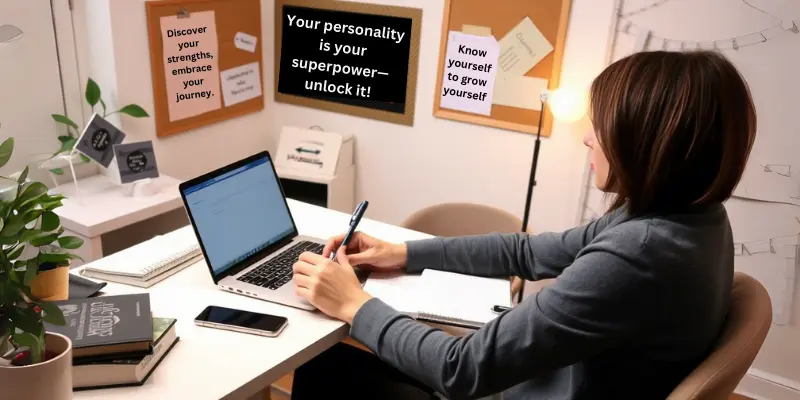What is a Personality Test? A Simple Guide for Beginners
Published: 14 Jan 2026
Have you ever wondered why you act the way you do or why others behave so differently? A personality test is a tool that can help you discover more about yourself. It gives you a clearer picture of your strengths, weaknesses, and preferences. So, What is a personality test? Simply put, it’s a way to understand your unique personality traits and behaviors.
Hi, I’m Tanveer. I have years of experience exploring personality tests. In this article, I’ll explain a personality test, its types, and how they can be useful in your personal and professional life.
By reading this article, you’ll gain valuable insights into who you are and how to make better choices. You’ll learn how personality tests can guide personal growth and career decisions and improve relationships. Ready to discover more about yourself? Let’s get started!
Understanding: What is a Personality Test?
A personality test helps you understand yourself better. It’s like a mirror for your mind, showing your strengths, weaknesses, and what you enjoy. You can learn more about how you think and act by answering simple questions.
For example, you might discover if you’re more outgoing or prefer quiet time alone.
Knowing yourself is the beginning of all wisdom.Aristotle
Definition of a Personality Test
A personality test is a tool that shows patterns in how you think, feel, and behave. It helps you understand what makes you unique.
For instance, you will realize that you like helping others or solving problems. Knowing these things lets you choose the right career or improve your relationships.
Types of Personality Tests
Exploring different personality tests can provide valuable insights into your strengths, preferences, and potential career paths.
1. Myers-Briggs Type Indicator (MBTI)
The MBTI is a popular test that helps you understand how you think, make decisions, and interact with others. It puts people into 16 different types based on four main things:
- Introversion (I) vs. Extroversion (E): Do you prefer spending time alone or with others?
- Sensing (S) vs. Intuition (N): Do you focus on details or the big picture?
- Thinking (T) vs. Feeling (F): Do you make decisions using logic or emotions?
- Judging (J) vs Perceiving (P): Do you like structure or freedom in your life?
When I first took the MBTI test, I was surprised to learn that I’m an INTJ (Introverted, Intuitive, Thinking, Judging). I always liked to plan and strategize, but the test confirmed it. It helped me understand why I prefer structured work and enjoy tasks that require deep thought and strategy.
Let’s say you want to pick a career. If your result shows you’re an INTJ (Introverted, Intuitive, Thinking, Judging), you might enjoy jobs that require strategy, like engineering or planning. But if you’re an ESFP (Extroverted, Sensing, Feeling, Perceiving), you might be happier in jobs where you can be creative and social, like acting or event planning.
2. Big Five Personality Traits
The Big Five test looks at five important parts of your personality. These are called OCEAN:
- Openness: How much do you like trying new things?
- Conscientiousness: Are you organized and responsible?
- Extraversion: Are you outgoing and social?
- Agreeableness: Are you kind and cooperative with others?
- Neuroticism: Do you stay calm, or do you get anxious easily?
When I took the Big Five test, I scored high in Openness. This made sense because I enjoy exploring new ideas and creating creative projects. It gave me clarity on why I love experimenting with different approaches in my work.
If you score high in Openness, you probably like trying new things and exploring new ideas. You might enjoy careers like research or design. If you score low in Openness, you may prefer stability and routines, so jobs in accounting or administration suit you better.
3. DISC Assessment
The DISC test looks at how you behave in work and social settings. It divides people into four groups:
- Dominance (D): You’re confident, goal-driven, and like challenges.
- Influence (I): You’re outgoing, social, and persuasive.
- Steadiness (S): You’re patient, reliable, and work well in teams.
- Conscientiousness (C): You’re detailed, organized, and precise.
After taking the DISC test, I learned that I fall into the Conscientiousness category. I prefer to be organized and detail-oriented, and I always aim for precision in my work. Knowing this helped me focus on roles that required strong attention to detail and organization.
Consider Imran Khan, a strong leader with clear goals. He shows Dominance (D); decisive and ambitious. Now, look at Cristiano Ronaldo; he’s a great motivator and team player. He shows Influence (I): charismatic and inspiring. Knowing where you fit in these categories can help you be a better leader or team player.
| Did You Know? |
|---|
|
Advantages of a Personality Test?
Personality tests are not just fun quizzes; they help you understand yourself better. They show you how you think, why you act the way you do, and how you relate to others. If you’re trying to figure out your career and personal goals or how to improve relationships, these tests can help guide you.
1. Self-Awareness
Taking a personality test can really open your eyes. I remember when I first took one, I couldn’t believe how much it showed about me! It helped me understand why I do certain things and made me feel more comfortable being myself.
2. Career Guidance
For students and young professionals, personality tests are super helpful for choosing a career. I’ve seen students discover they’re more creative than they realized, which led them to fields like design or the arts. A quick test can give you a better idea of what jobs fit you best, whether it’s leadership or something more hands-on.
3. Better Relationships
Personality tests are also great for improving relationships. You can communicate and connect better once you know more about your personality and others. I’ve noticed that understanding why I react a certain way helps me get along better with people at work and in my personal life.

How to Take a Personality Test
Taking a personality test is a straightforward process that can offer valuable insights into your behavior, preferences, and even career direction.
Below are the key steps to make the most of the experience.
1. Find a Reliable Test Online
The first step in taking a personality test is to find a trustworthy and credible source.
- Many personality tests are available online, but not all are accurate or helpful. Stick to well-known tests like the MBTI, Big Five, or DISC that are widely accepted and have been validated for providing meaningful results.
- To ensure the test is reliable, check if it’s backed by research or created by psychology professionals.
2. Answer Honestly
When taking the test, answering all the questions honestly is important.
- The results will only be useful if you are truthful about your thoughts, feelings, and behaviors.
- Personality tests are designed to reflect your natural tendencies, so try not to overthink or second-guess your responses.
- Don’t try to choose the “best” answer. Answer based on what truly feels most like you, even if it’s something you don’t always acknowledge.

3. Review Your Results
After completing the test, take time to review the results carefully.
- They will provide insights into your strengths, challenges, and potential career paths.
- Some tests give a detailed explanation of your personality type, while others offer a more general overview.
- Either way, take the time to reflect on the information and see how it aligns with your own experiences.
- If the results are not clear or seem confusing, don’t worry! They’re just a starting point for self-reflection and personal growth.
| Don’t Overthink Your Answers |
|---|
|
One of the most important things to remember when taking a personality test is not to overthink your answers. Sometimes, our first instinct is the best one. Trust your gut feeling and allow the process to flow naturally. A personality test aims to help you better understand yourself, not stress you out. |
I’ve taken personality tests multiple times, and I learn something new about myself each time. The first time I took one, I was surprised by how accurate the results were. I knew myself well, but the test revealed a few things I hadn’t fully acknowledged. It’s a helpful tool for self-discovery that can lead you to make smarter decisions about your career, relationships, and personal goals.
The greatest discovery in life is self-discovery. Until you find yourself, you will always be someone else.Myles Munroe
Conclusion
What is a personality test? It’s a simple tool that allows you to understand yourself better. With just a few questions, you can discover your natural tendencies and get a clearer picture of how you think, feel, and behave. This understanding can be incredibly useful in both personal and professional life.
I highly recommend taking a personality test to learn more about yourself. It’s an eye-opening experience that can guide your personal growth and decision-making.
Take the test and share your results with friends or family to compare and learn more about each other!
FAQs
Here are some common questions with answers to provide more insight into personality tests.
Personality tests can give valuable insights into your behavior and preferences, but they aren’t always 100% perfect. They offer a snapshot of your traits, but personal growth and experiences may influence your results over time. Take them as helpful guides, not as absolute truths.
Yes! Your personality can evolve due to life experiences, challenges, and personal growth. You may notice different preferences or behaviors as you gain new insights and experiences. It’s all part of the natural process of self-discovery and development.
Many online personality tests are free, but some more detailed or professional ones might require payment. Free versions can still provide useful insights, but paid tests often offer deeper analysis. Choose what works best for your needs and goals.
A personality test can guide careers that align with your natural strengths and preferences. If you know you’re more introverted, you may prefer jobs that involve independent work. It’s a helpful tool for making more informed career choices.
Yes! Understanding your personality and that of others helps improve communication and reduce misunderstandings. It gives you insight into how you respond in different situations and how to better connect with others.
Definitely! Personality tests can guide your personal development by revealing your strengths and weaknesses. They help you recognize areas where you can improve and encourage you to work on your goals.
When you review your results, take time to reflect on how they align with your experiences. Look at your strengths, areas of growth, and preferences. If the results seem confusing, consider them a starting point for deeper self-reflection.

- Be Respectful
- Stay Relevant
- Stay Positive
- True Feedback
- Encourage Discussion
- Avoid Spamming
- No Fake News
- Don't Copy-Paste
- No Personal Attacks

- Be Respectful
- Stay Relevant
- Stay Positive
- True Feedback
- Encourage Discussion
- Avoid Spamming
- No Fake News
- Don't Copy-Paste
- No Personal Attacks






